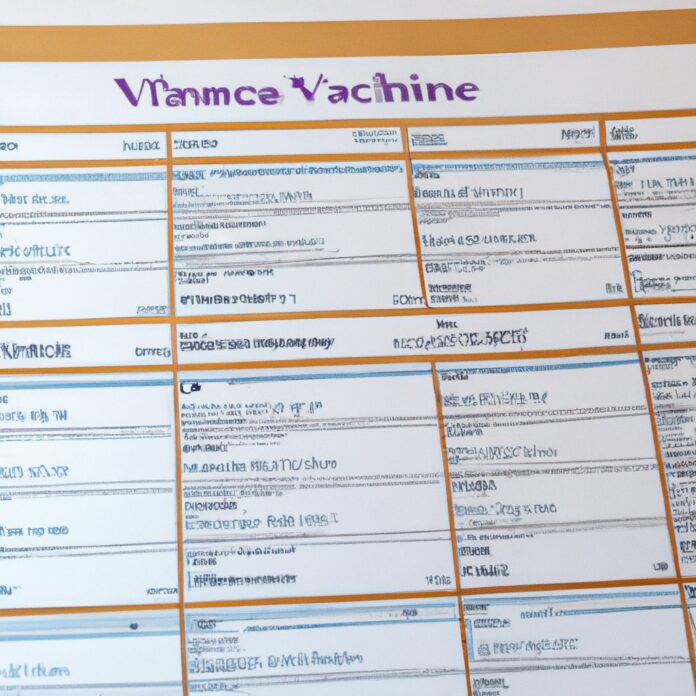Vaccines are essential in protecting the health of all children, helping them to develop strong immunity against deadly diseases. Knowing the right vaccine schedule for your child will ensure that they are up to date on immunization. This comprehensive guide will help provide you with an understanding of the recommended vaccine schedule for children and the benefits of staying on track.
1. “Healthy Protection: The Best Vaccines for Young Children
Vaccines are vital to protect us from disease. They help protect your child against serious and potentially deadly illnesses, like measles and whooping cough. Choosing to vaccinate your child is one of the most important decisions you can make when it comes to the health and wellbeing of your family. Here are some of the best vaccines for young children:
- Tetanus, Diphtheria, and Pertussis (Tdap): This vaccine is known as the primary ‘booster’ vaccine required in protecting children against the three diseases. It is recommended for all toddlers over 12 months of age, and is considered the most important vaccine in protecting children from disases.
- Polio: Polio is a highly infectious virus and can lead to paralysis and even death. The vaccine is recommended and usually given in several doses starting at two months old, and takes up to three doses to be effective.
- Measles, Mumps, and Rubella (MMR): This MMR vaccine is given in two doses, usually separated by a few weeks. It is given in early childhood, protecting your child against measles, mumps and rubella. It is important to make sure your child is up-to-date on their MMR vaccinations.
- Hepatitis B: This virus can cause liver damage and is often contracted through contact with infected blood or body fluids. It is recommended to be vaccinated at birth and is usually given as part of a combined vaccine, with a few doses required for full immunity.
It is important to always consult a healthcare professional before making any decisions when it comes to your child’s vaccinations. Your doctor can help determine which vaccines are best and most important for your child’s health.
Vaccines can be the difference between life and death for your child. By consulting with a healthcare provider and keeping your child up-to-date with their recommended vaccinations, you can ensure your child’s health and safety.
2. A Step-By-Step Guide to Vaccination Schedules
1. Planning Your Vaccination Schedule
The importance of vaccinations for preventing communicable diseases is well established, and it is recommended that children receive vaccinations at certain ages. To ensure that your child is optimally protected, you should consider creating a specific plan for the vaccination schedule. You will need to make sure to coordinate with your local authorities and find out which vaccine is available at what age and what is needed to get the vaccine. Planning ahead will help you to make sure that your child is protected before they are exposed to the disease.
2. Vaccination is Not Optional
Vaccines are the best way to protect your child from preventable diseases, so it is important that you make sure they receive their vaccinations on time. Vaccines have incredibly low side effects making them extremely safe for children. Vaccines are not just important for individual children, but for the larger community as well. Vaccinating your child will protect others who may be in contact with them who might not have received or responded to the vaccine.
3. Understanding Different Phases of Vaccination
It is essential to understand the various phases for the vaccination schedule. The standard schedule has three phases which include primary, booster and pre-teen/teen. The type and timing of the vaccines, and the number of doses required in each phase, will depend upon your child’s age. Consult with your local healthcare provider to confirm the right schedule and start receiving those vaccinations.
- Primary vaccinations begin from two months old
- Booster vaccines begin from 12-18 months
- Pre-teen and teen vaccines begin from 11-12 years
4. Making sure Vaccinations are up to Date
It is important to stay informed about the vaccines your child needs and get them all on time. Make sure you receive updates about when and where your child needs to get the vaccines. This can help avoid any delays or complications and enable you to keep your child’s vaccination record up to date.
3. Immunization Benefits: Reaping the Rewards of Vaccination
Immunization has long been recognized as an effective measure for protecting health. It provides a way of shielding against disease, particularly in vulnerable populations. Its overall benefits to health and societal well-being cannot be overstated.
Protection from Disease
Vaccines are an essential way of providing protection against certain infectious diseases. Immunization can help keep individuals of all ages healthy, and it is particularly valuable for young children, elderly and pregnant individuals who may be more vulnerable to diseases.
Reduction in Hospitalization
Vaccines often spare their recipients from hospitalization, a considerable expense for the healthcare system. Also, immunization can reduce the risk of certain serious illnesses, such as typhoid fever, meningitis and hepatitis B, which can lead to costly treatment for families.
Building Healthy Communities
A key advantage of immunization is that it contributes in producing healthy communities. Vaccines are part of the groundwork for a healthier society, helping to check the spread of contagious diseases and nipping problems in the bud before they can take hold.
- They promote public safety by decreasing unnecessary costs and devastative illnesses.
- They protect vulnerable populations, especially children, elderly and pregnant individuals.
- They contribute to the promotion of healthier communities by encouraging people to get vaccinated and spreading information about the importance and benefits of immunization.
Vaccines are not only beneficial on a personal level, but their effects can be felt on a broader scale, strengthening the health of a community and a nation as a whole. Vaccination is an easy and cost-effective way to reap the rewards of maintaining good health.
4. Know the Basics: Deeper Understanding of Vaccines
Vaccines are an essential part of modern health care, and it pays to be informed about their use. As you explore the different types of vaccines and their individualized benefits, remember that understanding the basics is key to making an informed health decision.
Benefits of Vaccination
Vaccines protect against numerous pathogens that have the potential to cause serious illness and even death. Some childhood illnesses once thought to be all but eradicated have made a comeback in recent years, prompting more families than ever to make sure their kids get vaccinated. Various vaccines available save lives by preventing not just human-to-human transmission of disease, but also collateral environmental effects of certain pathogens that could lead to devastating consequences.
Risks and Side Effects
While the benefits of vaccination clearly outweigh the risks, there is still some risk involved. The primary risks associated with vaccination include the potential for a mild adverse reaction, either on the spot or in the days that follow. Severe reactions are rare but can, in some cases, be life-threatening. The potential for an adverse reaction is why it’s essential to fully inform yourself of the vaccine you are considering and to discuss any potential risks or side effects with your doctor.
Making an Informed Decision
Researching the various types of vaccines is a great starting point in understanding the basics of vaccine administration. Be sure to consult resources you trust for up-to-date information about a particular vaccine, and make sure to listen to your doctor’s opinion before making assumptions. Ultimately, an informed decision can be made in partnership with your physician, taking into account your health needs, lifestyle, and personal concerns.
- Research up-to-date information about a particular vaccine
- Discuss potential risks or side effects with your doctor
- Take into account your health needs, lifestyle, and personal concerns
In the end, learning the basics of vaccination is essential for making an informed decision about your own health care. Knowing the benefits, risks, and potential side effects of vaccination are key to protecting yourself and your loved ones.
5. Enhancing Immunity: A Parent’s Role in the Vaccination Process
Vaccinations are an important part of health and a key factor in developing strong immunity in children. Parents have an important role to play when it comes to ensuring their children stay healthy. Here are five ways to help children get the most out of the vaccination process:
- Know the schedule: It is important for parents to ensure they are aware of their child’s schedule when it comes to vaccinations. Most states have a recommended timeline for when certain vaccines need to be administered. Make sure to neither fall behind nor get ahead of the timeline.
- Visit a trusted pediatrician: Find a pediatrician you can trust and rely heavily on their expertise when it comes to vaccinations.
- Emphasize the importance: Whenever you have an opportunity to discuss it, emphasize the importance of vaccinations for your child’s health. This will help ensure full compliance from the children.
- Know the alternatives: Some parents may be hesitant with certain vaccinations. Discuss the alternatives with your pediatrician for a better understanding.
- Be aware of side effects: Vaccinations do have short-term side effects, so be aware and expect them. Again, discuss this with your pediatrician to be prepared.
At the end of the day, vaccinations are important and help children build immunity and stay healthy. It is up to the parents to make sure their children get the necessary vaccinations in a timely and safe manner. By following these steps, parents can make sure their children get the most out of their vaccinations.
Immunizing your child on the recommended schedule is the best way to protect them from serious illnesses. For more information about the vaccine schedule for children, talk to your healthcare provider and, of course, do your own research. With correct and up-to-date information, you can make an informed decision about your child’s health. Together, we can keep our children safe and healthy.

